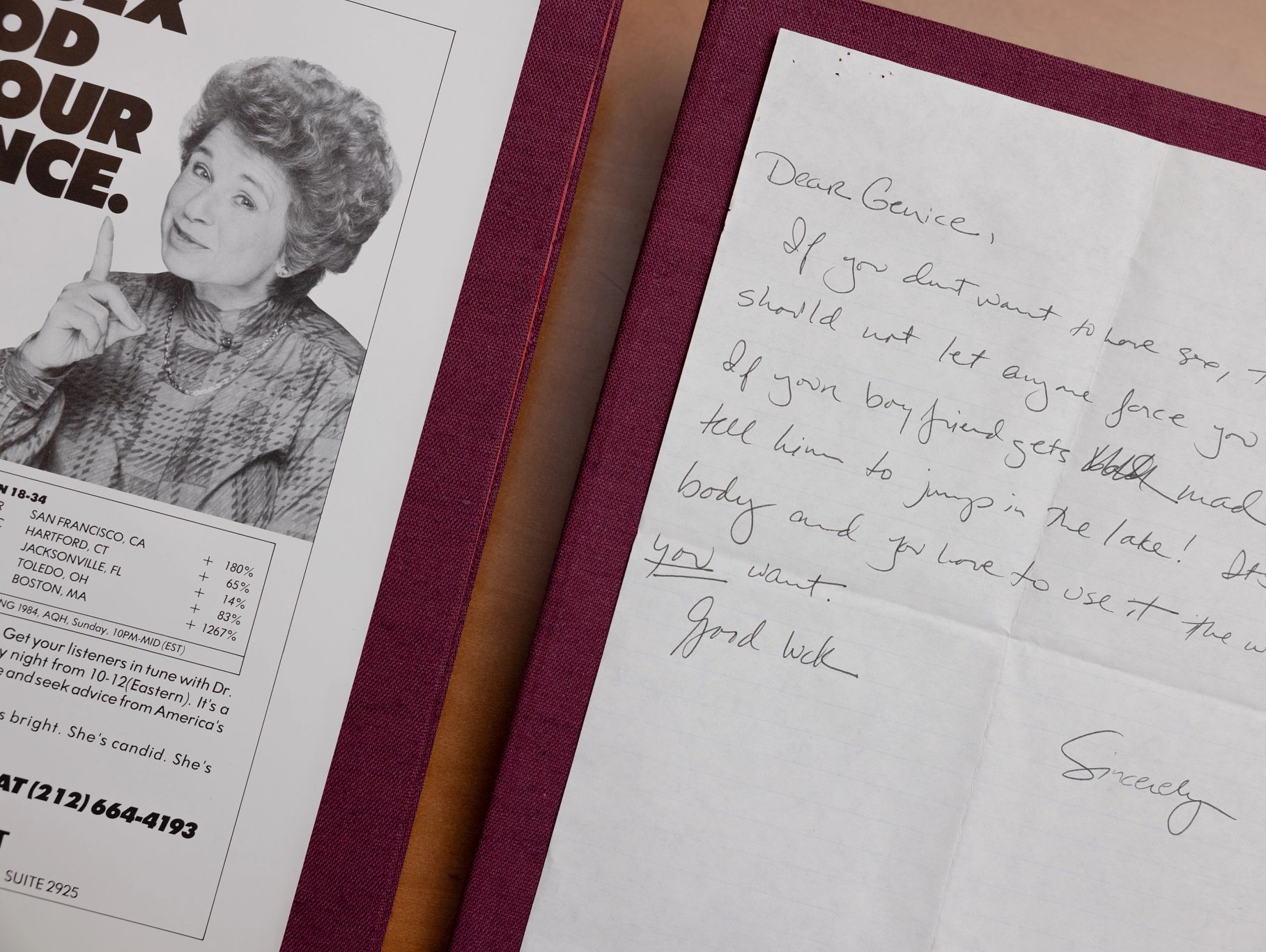AARP Hearing Center
By Christina Ianzito, AARP
Illustrations by Ryan Olbrysh
Entertainment
The late sex therapist’s private letters capture her spirit — and Americans’ sexual preoccupations in the 1980s
By Christina Ianzito, AARP
Illustrations by Ryan Olbrysh
Before Google, before Siri and way before ChatGPT, there was Dr. Ruth.
Ruth Westheimer, who died in July at age 96, served up frank advice about sex when many people didn’t know where to turn with their most personal questions. Known for her sweet-but-no-nonsense grandmotherly vibe, Dr. Ruth answered them, and became an unlikely cultural revolutionary by discussing previously only-whispered-about things like masturbation, dildos and penis size on her wildly popular 1980s late-night radio show Sexually Speaking.
Young people — GenXers — would tune in, rapt, from their bedrooms, doors shut. “I grew up as a teenager who was listening to her with the volume really low so my mom wouldn’t notice,” says Allison Gilbert, 54, coauthor with Pierre Lehu, of a lovely new book that Dr. Ruth completed before her death, The Joy of Connections: 100 Ways to Beat Loneliness and Live a Happier and More Meaningful Life (Sept. 3). “These were subjects that my mom was not comfortable having with me … but as a hormone raging teenager, I was really curious about.”
Hundreds of the mostly handwritten letters sent to Dr. Ruth from listeners were released to the Library of Congress last year. When 38 of those boxes became open to researchers in June, we jumped at the chance to look through them, along with copies of her typed responses attached to many of them.
Reading them is like traveling back in time some 40 years — when sex ed, for many of us, came mostly from older siblings or more precocious friends (or, even less usefully, The Love Boat). Until Dr. Ruth came along.
Here are some highlights from Dr. Ruth’s priceless archive.


Letters from Westheimer’s archive at the Library of Congress.Tom Sandner
Many of the letters Dr. Ruth received were from teens or young adults, who had very basic questions about sex.
An 1982, an 18-year-old wrote a four-page letter expressing worry about her first kiss with her boyfriend. “I hope that you can explain to me … how to kiss him. What will he be doing with his tongue and what should I do with mine to make it as wonderful as possible?”
Dr. Ruth wrote: “It is perfectly OK to say to your boyfriend, ‘I’ve never done this before, could you show me how?’ The most important thing is that you feel good about yourself — the way you are now — never be ashamed of that.”
Another wrote that she’d only had sex once, and “I am not sure if I experienced orgasm. What does it feel like?” and “Is it true that you can experience it by yourself?” Dr. Ruth said, “You ask good questions about orgasms!” Among other things, “an orgasm is like a pleasurable sneeze,” she explained, beautifully.

Many letter writers worried about how often they masturbated: Was it too often? Dr. Ruth always reassured them that there really isn’t a “normal” — or, rather, normal encompasses a heck of a lot.
One wrote, “I am 21 years old and I very often masturbate. I would like to know if there is an average number of times (weekly or daily) that a person does these [sic] thing. I’m very worried.…” No, Westheimer responded, “I am sorry to say that there is no daily or weekly average frequency of masturbation for people of any age. Some people masturbate every day and this is entirely normal.”
To a 35-year-old mother of two who couldn’t stop fantasizing about her gynecologist, Dr. Ruth wrote, “If your guilt feelings about your fantasies are straining your marriage, I think you should stop feeling guilty.… It is perfectly all right to fantasize about someone other than a husband before and during sex. As long as you keep it to yourself and it remains a fantasy only, I see no problem in it.”
Many letters were about couples unable to communicate their individual desires. A man and woman from New York City wrote to say they’d been married for 12 years, “and something seems to be missing. We both feel it is because we cannot talk about sex properly together.”
Dr. Ruth responded, “You two must talk to each other but not in bed. Go to a romantic restaurant together and tell each other what pleases you the most.” She suggested they read The Joy of Sex by Alex Comfort (she recommended the book to many others as well). If all that didn’t work, she advised them to see a therapist.
To a man whose wife wasn’t as interested in sex as he was, she wrote, “I think the key here is experimentation and conversation.… Also, I may add, it may help if you masturbated once or twice a week to relieve your desire a little!”

A woman in Manhattan asked where she could find an “elitist” male escort service because “I consider myself ‘classy,’ ” and she was concerned about catching herpes. Dr. Ruth wrote, “I’m sorry to say that I have no tips about how to find an elitist, herpes-free male prostitute. There must be one out there, but I haven’t the slightest idea of where he is. Thanks for writing and good luck!”
Similarly, to a man looking to hook up with swingers: “I am not able to provide you with a list of clubs, ads, or introductions to swingers, but I do hope you find the swinging couple you seek.… In any case, good luck and have good sex!”
Similarly, there were sperm-related questions that our weighty sets of encyclopedias clearly couldn’t answer. In response to “Is there any way [a woman] can get pregnant from swallowing sperm?” Dr. Ruth praised the letter writer. “It is important to ask questions if you are not sure of something,” she wrote, then reassured the woman that, no, she could not get pregnant in this way.
Another woman shared in 1983 that she and her boyfriend engaged often in oral sex, and “I have found myself gaining weight remarkably. Is it possible that oral sex could have contributed to it?” Dr. Ruth replied, “Sperm are protein and therefore do contain some calories — but they are negligable [sic]. Your recent weight gain is unrelated to engaging in oral sex. Just continue to enjoy each other and cut down on those ice cream cones!”
A man from Los Angeles confided that one day he didn’t have a pair of underwear handy so he put on his pants without them. Not only did he find it to be comfortable, his “girlfriend really thought it was sexy.” He wondered, “Would I be causing myself any harm if I were to occasionally or continuously leave my underpants off?” Dr. Ruth told him not to worry: “If you are comfortable not wearing undershorts then there is no harm in it.”

Juergen Frank/Corbis via Getty Images
Dr. Ruth was unwavering about a few things.
A woman once told her on-air, “My boyfriend and I are getting into whips and chains.” Westheimer’s immediate response: “With contraception?” She repeated the importance of contraception like a drumbeat. “No, your girlfriend cannot get pregnant if you ejaculate into the hot tub,” she told one letter writer, but “make sure you use [contraceptives] if you decide to have intercourse.”
A woman wrote that she was having an affair with her married boss and worried that he’d never leave his wife. Dr. Ruth replied, “You ask me to voice my opinion and I will. I think that if you wish a lasting relationship with a man, you should not go out with married men. You will never have him to yourself and you will always be miserable.” (She elaborated on this point but, in a sign of the times, never noted that the woman’s partner being her boss was a problem in itself.)

She was supportive of the gay community — particularly when AIDS hit the headlines in the early 1980s. “It carried stigma,” notes Gilbert, “and there was a population who were made to feel so othered … she had felt that herself” as a Jewish person in Germany and during what was a very lonely childhood (she was orphaned during the Holocaust).
A young woman in New Jersey said she told her parents she was gay and they took her to a priest and a “religious psychiatrist, thinking they could ‘CHANGE ME,’ ” and told her, “Either I change or move out.”
Westheimer acknowledged, “Your situation is so difficult.… I can’t tell you what to do, but I always feel that in cases like this that we all have to ultimately stand up for ourselves, even if it means a bitter rift with our parents. They are the ones that will have to change, and, maybe, slowly, they will come around to accept you as the wonderful person you are.”
Dr. Ruth was clearly thrilled to hear from a woman in Nevada who wrote in 1983 that she was in her 50s and her sex life, with her younger husband, was fantastic: “Our love is still at the peak and often enough for seconds and thirds nightly, almost every other night of the week.” Her question: “How long can I keep this up?”
“Thank you for your joyful letter,” Dr. Ruth wrote back. “First, let me say that sexual activity need not decrease with age. There is a myth in our society that older people don’t want or need sex — not true!” She ended the letter with “You’re a lucky woman and I’d love to hear how you’re doing in ten years!”
To a writer contemplating having sex for the first time, she agreed that it’s a big decision — then shared her sex-positive philosophy in a way that was so very Dr. Ruth:
“Sex, like many other things human beings can do, is a skill. It is not something that comes naturally. Sex is something we are always, throughout our lives, learning to engage in. We are constantly learning about our own needs changing, and the changing needs of our partners. So I suggest you approach your first sexual encounter with the openness of a child on the first day of school — excited with the possibilities before you and open to all the new things you will learn.
“Good luck!
“Sincerely,"

Christina Ianzito covers scams and fraud, and is the books editor for aarp.org and AARP The Magazine.
More From AARP